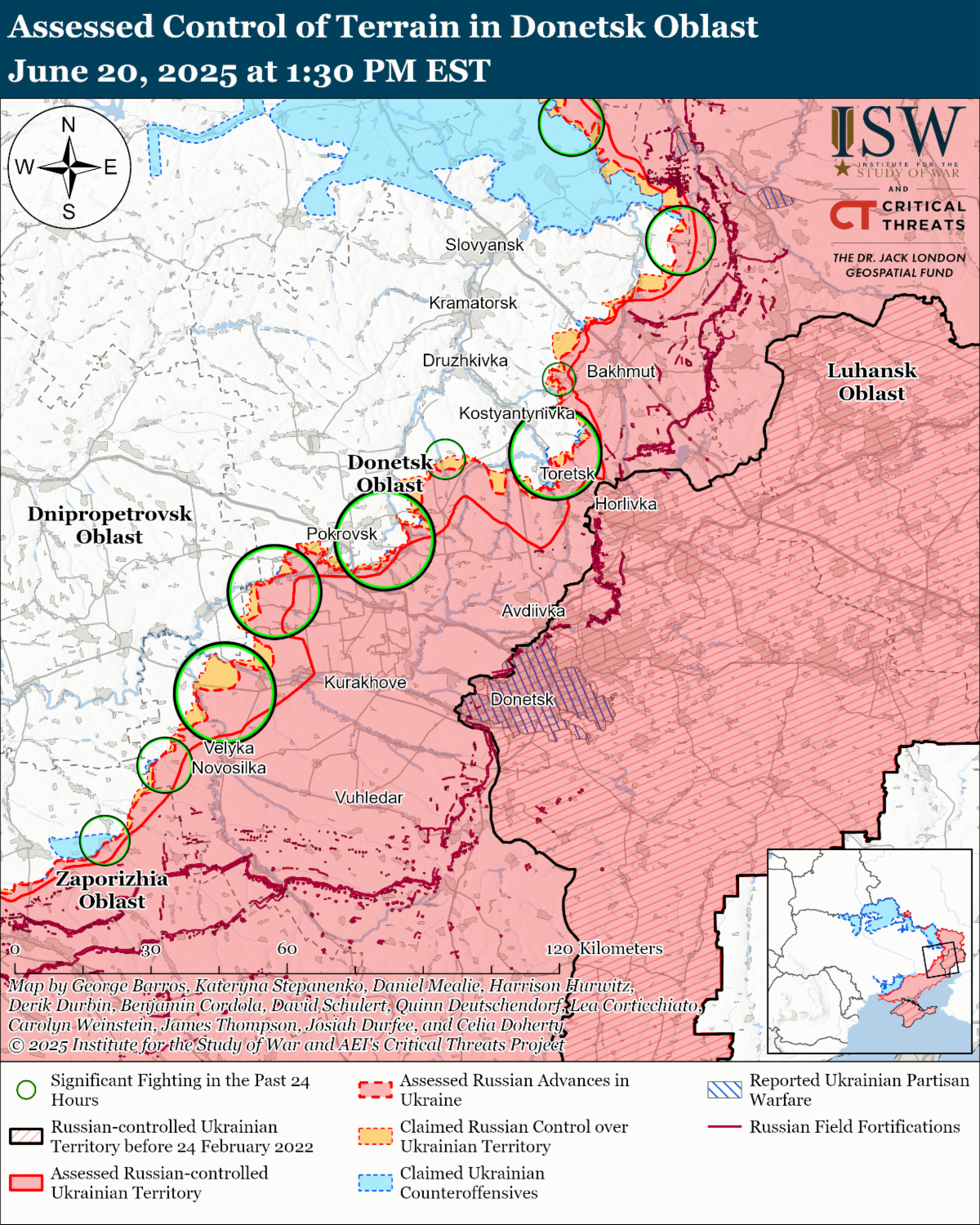Russian President Vladimir Putin claimed that Russians and Ukrainians are one nation and all of Ukraine is effectively Russian as part of efforts to justify his continued conquest of Ukraine. Putin answered a question after his speech at the St. Petersburg International Economic Forum (SPIEF) on June 20 about why Russian forces are advancing beyond the territories in Ukraine that Russia has illegally annexed, claiming that he considers Russian and Ukrainian people to be "one people in reality" and that "Ukraine is [Russia's]." Putin has repeatedly demonstrated that he does not consider Ukraine as an independent state with its own history, identity, and culture separate from Russia, as evidenced by his 2021 "On the Historical Unity of Russians and Ukrainians" essay and his repeated false assertion that Russians, Belarusians, and Ukrainians are all part of one historical people.
ISW has previously noted that the Kremlin's ongoing information operation attempting to portray Russians and Ukrainians as one unified nation and culturally and historically homogeneous is one of its most significant information operations aimed at undermining Western support for Ukraine and justifying the war effort to the Russian people. Putin's commitment to this narrative underscores his ongoing commitment to destroying the Ukrainian state and subjugating the Ukrainian people.
Putin asserted that Russia will be able to achieve its goals through a protracted war in Ukraine. Putin claimed on June 20 that it would be better for Ukraine to stop fighting because the battlefield and geopolitical situation will only worsen for Ukraine, and that Ukraine will have to negotiate from a weaker position. Putin attempted to posture Russia as interested in engaging in negotiations to end the war, claiming that Russia is not seeking "Ukrainian capitulation," yet insisted that Ukraine recognize the "realities that have developed on the ground." Kremlin officials often call for Ukraine to recognize the "realities on the ground" (a reference to the frontline in Ukraine) to allude to the idea that Russia is in a stronger negotiating position given the situation on the battlefield and to demand that Ukraine concede to Russia's unwavering demands.
Putin's claim that Ukraine must recognize the "realities on the ground" and should negotiate before the situation worsens also coheres with Putin's theory of victory, which assesses that Russian forces will be able to win a war of attrition by indefinitely sustaining gradual advances along the frontline despite the high costs of such creeping advances. Putin's statement ignores that the true "realities on the ground" show a complicated and hotly contested frontline situation in which Russian forces are slowly making marginal advances at the cost of significant manpower and materiel losses in the face of significant Ukrainian drone-based defenses.
Key Takeaways:
- Russian President Vladimir Putin claimed that Russians and Ukrainians are one nation and all of Ukraine is effectively Russian as part of efforts to justify his continued conquest of Ukraine.
- Putin asserted that Russia will be able to achieve its goals through a protracted war in Ukraine.
- Putin and other Kremlin officials are using the guise of "buffer zones" to expand Russia's territorial demands in Ukraine.
- The Kremlin continues to prioritize maintaining the facade of economic stability by pursuing economic policies that will likely exacerbate Russia's economic instability.
- Putin is attempting to obfuscate the reality that increased investment in Russia's defense industrial base (DIB) has come at the cost of Russia's civilian economic sectors.
- Open-source intelligence suggests that Russia is increasing its T-90M tank production capabilities
- Ukraine and Russia conducted the sixth prisoner of war (POW) exchange in accordance with the June 2 Istanbul agreements.
- Ukrainian President Volodymyr Zelensky appointed Brigadier General Hennadii Shapovalov as Commander of the Ukrainian Ground Forces on June 19.
- Russian forces recently advanced near Kupyansk, Siversk, Toretsk, and Pokrovsk.
| 




 [ISW] 이란 업데이트 특별 보고서, 2025년 6월 20일, 저녁 에디션
[ISW] 이란 업데이트 특별 보고서, 2025년 6월 20일, 저녁 에디션
 [ISW] 이란 업데이트 특별 보고서, 2025년 6월 20일, 모닝 에디션
[ISW] 이란 업데이트 특별 보고서, 2025년 6월 20일, 모닝 에디션